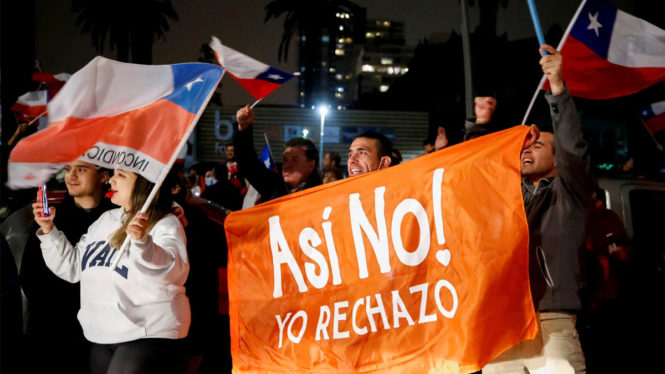Chile has said no to the new Constitution… The defeat in the plebiscite was produced by an overwhelming margin: almost 62% for “rejection” against 38.1% for “approval”. This result is a very hard blow for the Government of Gabriel Boric, who had bet everything on its approval. Even so, the current president has accepted the result and initiated a new process to draft a new constitution.
In 2019 Nearly 80% who approved the replacement of the old constitution. In this case, it is expected that there will be some type of agreement between political sectors to modify the current text or propose the drafting of another new version of the Magna Carta.
Why a constitutional change in Chile?
The failed constitutional project had the intention of leaving behind what sustained the oppressive dynamics of Pinochet’s Dictatorship. It was conceived under an ideology that declares the ideas of an important part of society unconstitutional. The new constitution project was a progressive standard adapted to the demands of the 21st century.
The people of Chile rebelled in 2019 against the inequality that neoliberalism sows. The intense outburst in the streets ended up filling the polls for Gabriel Boric. The actual president is the defender of the new constitution project that intended to banish the one approved in 1980 during the dictatorship of Augusto Pinochet.
Among the most outstanding points of the rejected reform are:
- From “Democratic Republic” to “Parity Democracy”: It proposes that women occupy at least 50% of all State bodies and orders measures to “achieve substantive equality and parity.”
- “Plurinational and intercultural state”: Recognizing 11 original nations and giving them Indigenous Regional Autonomies with political autonomy, giving them a broader constitutional advantage. It recognizes the legal systems of indigenous peoples, specifying that they must respect the Constitution and international treaties, and that any challenge to their decisions will be resolved by the Supreme Court.
- “Ensure conditions for pregnancy, voluntary interruption of pregnancy, voluntary and protected childbirth and maternity: The proposed fundamental law recognizes the free, autonomous and non-discriminatory exercise of sexual and reproductive rights
- Pensions, health and care: “Social and democratic state of law” that must provide goods and services to ensure the rights of people.
- Water: from “property” to “inappropriate” : Establishes a “human right to water”, which prioritizes it over other uses. Creates a National Water Agency for its sustainable use. People are interdependent with nature and form, with it, an inseparable whole. Nature has rights. The State and society have the duty to protect and respect them.”
- Political System : The government and the administration of the State correspond to the presidential figure. Also includes a reform on the legislative occupations.
Why did Chile decide to reject the proposal that granted more social rights than any other in the world?
The new text was not convincing despite the fact that it offered to ensure a pollution-free life, defended nature, the environment and considered the context of climate change. But Why?
Chileans have legitimate fears and that they are not necessarily progressive in all aspects of their lives. Many of those who want more social rights are also conservative people in a traditional country. The social uprisings of the last three years have not changed its most intimate structure. Chile did not feel prepared for such a drastic and stipulated change.
Added to all this is the ‘punishment vote’ for the country’s economic situation, where galloping inflation and a scenario of uncertainty means that the opposite of what the government demands is voted for in order to give a wake-up call.
Another change that brought a vast amount of rejection is the Indigenous Autonomy
clause. National population believes they would have privileges over other regular citizens, so they would not be equal before the Law.

In general, the rejection of the new constitution is due to a very radical and stipulated idea proposal. Chile recognizes the need for a new constitutional reform but also rejects the application of changes that do not represent all members of the population. The new reform process promised a political revolution for the South American country, and instead left Chile deeply divided over its future.
Even so, President Boric recognizes the will of his people and addresses the leaders of Congress to start a new process for the rewriting of the constitution.
“I call on the political forces to agree on the new deadlines […] the National Congress will be the main protagonist […] I promise to do my best to build a new constituent itinerary that gives us a text that manages to interpret a broad majority of citizens”.
